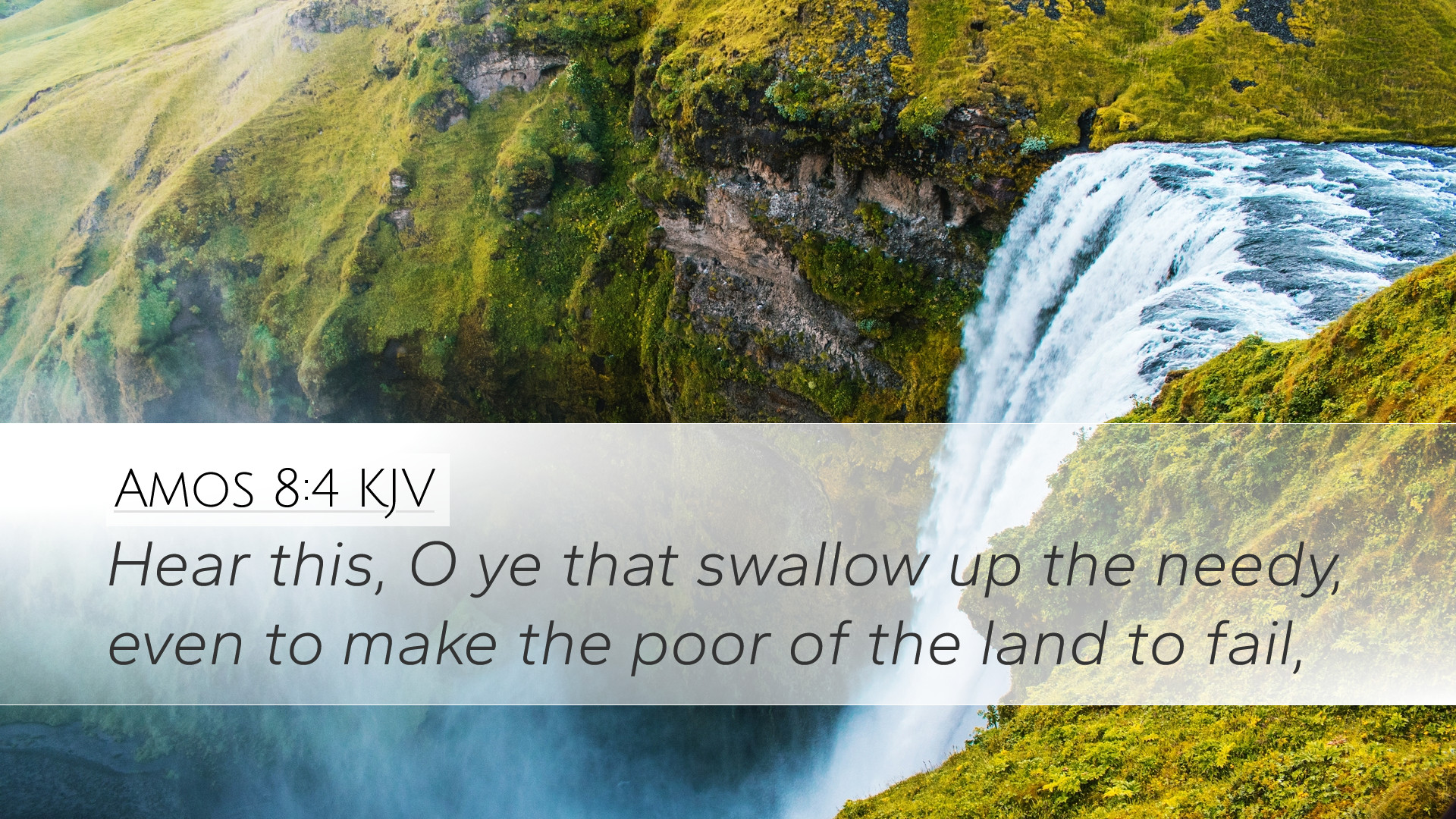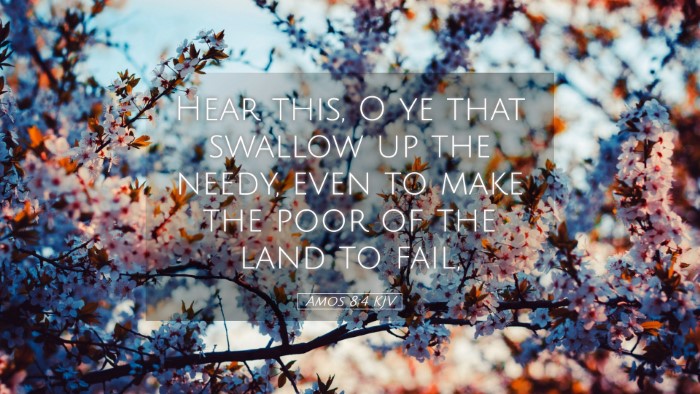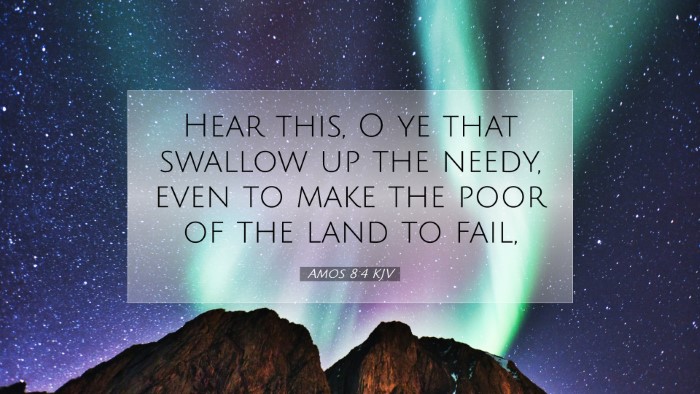Old Testament
Genesis Exodus Leviticus Numbers Deuteronomy Joshua Judges Ruth 1 Samuel 2 Samuel 1 Kings 2 Kings 1 Chronicles 2 Chronicles Ezra Nehemiah Esther Job Psalms Proverbs Ecclesiastes Song of Solomon Isaiah Jeremiah Lamentations Ezekiel Daniel Hosea Joel Amos Obadiah Jonah Micah Nahum Habakkuk Zephaniah Haggai Zechariah MalachiAmos 8:4
Amos 8:4 KJV
Hear this, O ye that swallow up the needy, even to make the poor of the land to fail,
Amos 8:4 Bible Commentary
Amos 8:4 - Commentary and Insights
Amos 8:4 states: "Hear this, you who swallow up the needy, and make the poor of the land fail." This verse serves as a powerful condemnation of the social injustices prevalent in Israel during Amos's prophetic ministry. Through various public domain commentaries, we can glean rich insights into the implications of this admonition.
Contextual Background
The Book of Amos is known for its sharp social critique, especially regarding the treatment of the poor and the corrupt practices of the rich. As a shepherd and farmer from Tekoa, Amos was uniquely positioned to observe both the agrarian lifestyle of the poor and the moral decay in the upper echelons of society. This verse specifically addresses the powerful elites who exploit the vulnerable, encapsulating one of the central themes of the prophetic literature.
Key Themes and Insights
-
Condemnation of Greed:
Matthew Henry emphasizes the idea that greed leads to a dehumanizing attitude towards others. The phrase "swallow up the needy" illustrates an insatiable appetite for wealth that disregards the welfare of others.
-
Social Injustice:
Albert Barnes highlights the social context of Amos's message. The poor were being oppressed in various ways, and Amos calls attention to the systemic injustices that allowed the rich to thrive at the expense of the marginalized.
-
Divine Judgment:
Adam Clarke notes that this verse is not merely a societal observation, but a prophetic warning. Those who exploit the needy will face judgment from God. This prophecy serves as a harbinger of the impending judgment that would befall Israel if there was no repentance.
Moral and Ethical Considerations
In what ways does this verse resonate with contemporary issues of social justice? The call to hear the plight of the needy is as pertinent today as it was in Amos's time. The Church is reminded to advocate for those who are marginalized in society. As Matthew Henry suggests, true faith manifests itself in justice and mercy towards others.
Responsibility of the Faithful
The faithful are urged to reflect on their role in society and the responsibility they hold towards the needy. Amos 8:4 can be seen as a clarion call for believers to live out their faith through active compassion. This extends not only to charitable giving but also to challenging unjust systems and advocating for reforms.
Historical and Cultural Relevance
Understanding the historical backdrop of Amos's prophecy provides depth to its interpretation. During Amos's time, Israel was experiencing relative prosperity, but this prosperity was disproportionately distributed. Those in power often engaged in unethical business practices, as indicated in the following verses, manipulating measures to defraud the poor.
The Economic Structures of Injustice
The "making the poor of the land fail" reference indicates an economic structure where the marginalized were not just surviving, but increasingly becoming impoverished. Barnes explains that the exploitation took many forms, including dishonest trade practices and usury.
Reflection and Application
As pastors, students, and theologians study Amos 8:4, it invites a reflective posture concerning their own practices and the settings in which they minister. Here are a few reflective questions and applications:
-
Personal Reflection:
How am I contributing to the welfare of the needy in my community? Are there ways in which I may inadvertently support systems of oppression?
-
Corporate Responsibility:
What should our churches and organizations do to support the poor and advocate for justice within our communities?
-
Prophetic Voice:
Are we willing to be the voice for the voiceless, as Amos was? How can we embody the ethical teachings of the prophets in our modern context?
Concluding Thoughts
Amos 8:4 stands as a sobering reminder of the ethical imperatives placed upon those who claim to follow God. With roots deeply embedded in the pursuit of justice, this verse challenges the faithful to lead lives that reflect God's concern for the needy. The insights from Matthew Henry, Albert Barnes, and Adam Clarke together underscore the timeless nature of this prophetic call, urging modern believers to discern their socio-economic environments and act justly.


